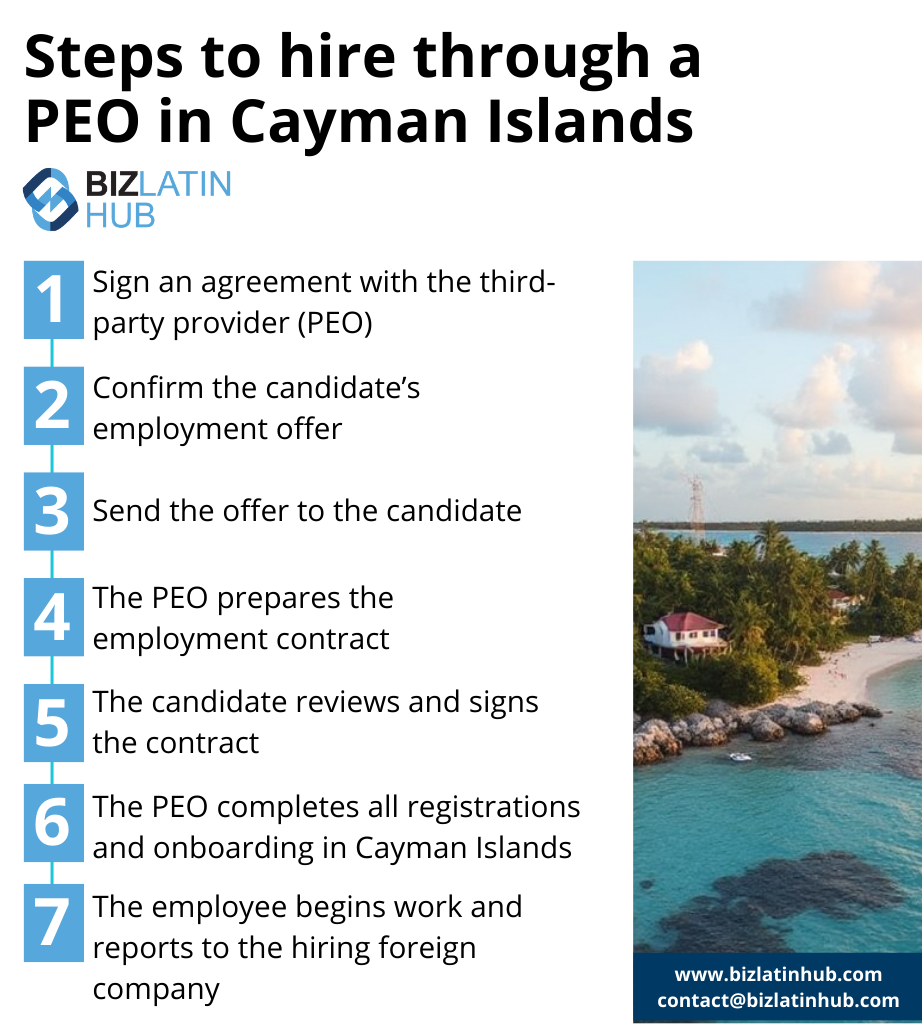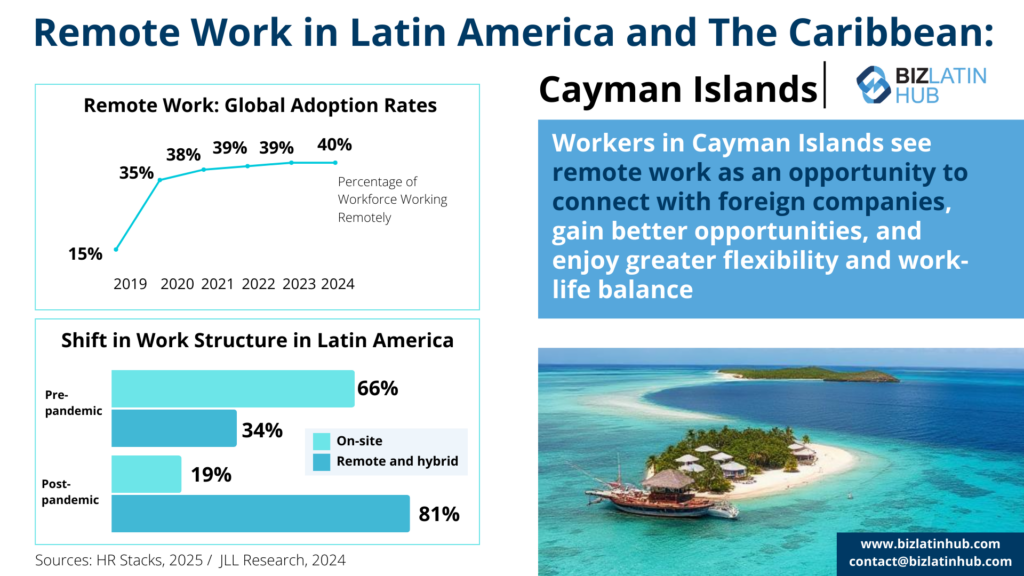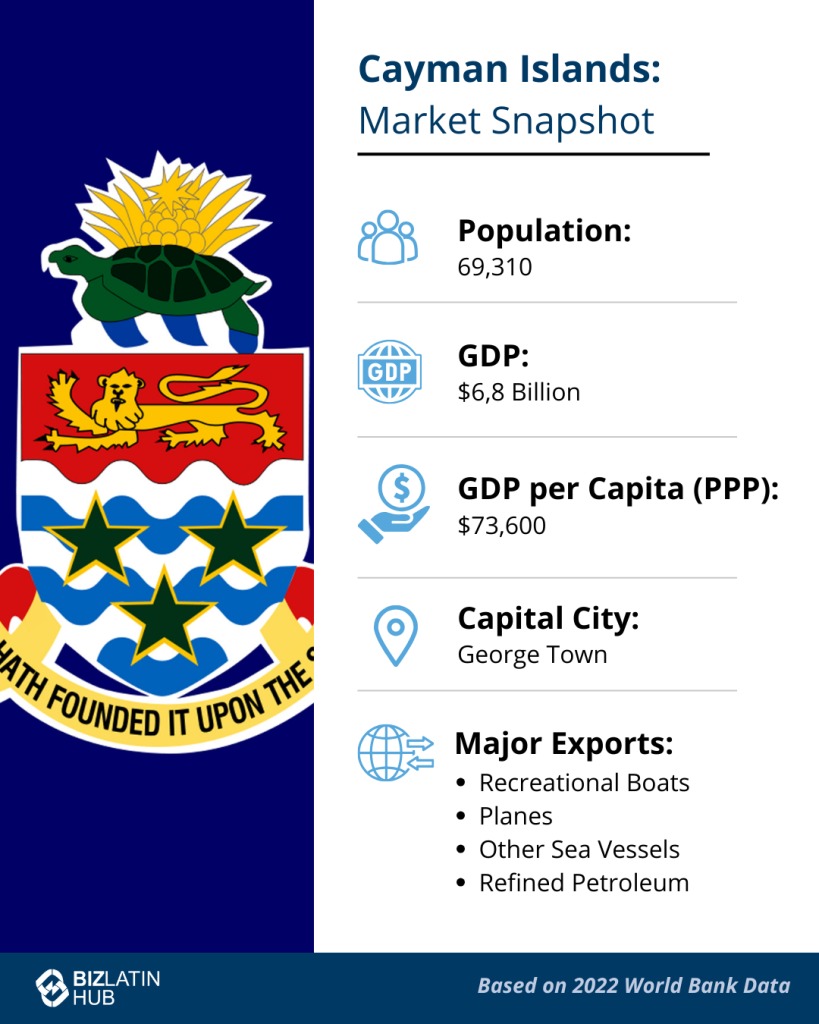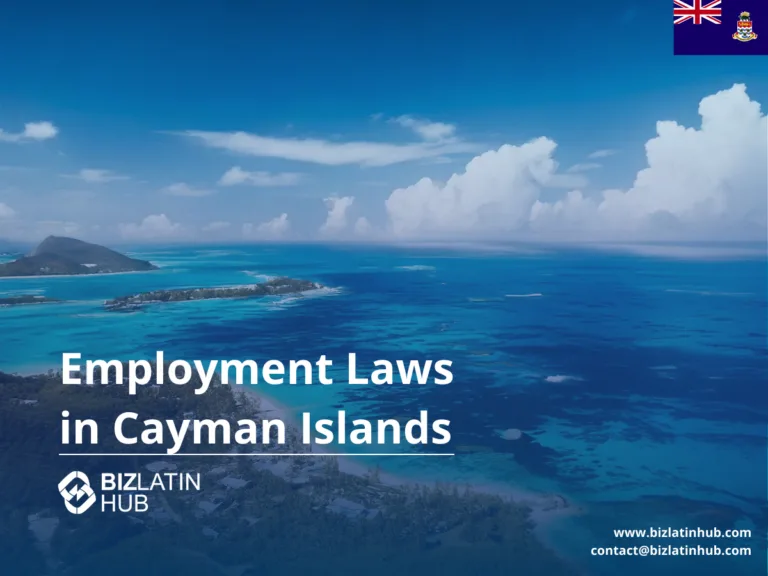People starting a business in the Cayman Islands and/or employing other should understand labor law. Labor laws influence the workforce. They also guide employer and employee actions. Labor laws support fair work environments. This article explains the labor law system clearly. It details employee rights and employer duties. The article also covers international business, new legal changes, and the function of legal help in the Cayman Islands. This guide details the essential obligations for employers under the Labour Act, including contracts, benefits, and termination procedures.
| Key Takeaways: Labour Law in the Cayman Islands |
| What are the mandatory contributions an employer must make? | It is mandatory for employers to contribute to a registered pension plan and a standard health insurance plan for each of their employees. |
| Can you have an oral contract in the Cayman Islands? | A written employment contract is a legal requirement. |
| What is the minimum wage in the Cayman Islands? | KYD$4.50-6 (USD$5.4-7.2) per hour. |
| What are the standard working hours and overtime rules? | The standard work week should not exceed nine hours per day or 45 hours per week |
| What happens upon termination? | All employees are entitled to statutory severance pay upon termination. |
Key Employer Obligations Under Caymanian Law
The Cayman Islands Labor Law protects employee rights. It also sets guidelines for employers. The Labour Act (2021 Revision) is central to this system. This Act states basic employment standards. The law requires employers to provide written employment contracts. These contracts must list job titles, duties, and work hours. The National Pensions Law and Health Insurance Law work with the Labour Act.
These laws give employees retirement benefits and required health coverage. The Labour (Amendment) Law, 2020, made important procedural updates. Rules like the Labour (Extension of Severance Pay Period) Regulations, 2020, offer specific direction on matters such as severance pay. The Immigration Law affects work permits for foreign employees. This ensures the system covers all employment aspects.
1. Provide a Written Employment Contract
Employers must provide employees with a written statement of working conditions (an employment contract) at the beginning of their employment. This contract must outline the key terms and conditions of the job.
2. Adhere to Wage and Hour Regulations
Employers must pay at least the minimum hourly wage. The standard work week should not exceed nine hours per day or 45 hours per week, with overtime paid for additional hours.
3. Make Pension and Health Insurance Contributions
It is mandatory for employers to contribute to a registered pension plan and a standard health insurance plan for each of their employees.
Expert Tip: Health Insurance as a Critical Compliance Point
From our experience, the mandatory health insurance requirement is the most critical and often misunderstood compliance point for new employers. It is not optional. Every employer must provide a policy that meets the minimum standards outlined in the Health Insurance Act for every employee.
The penalties for non-compliance are severe. We advise employers to secure a compliant group health insurance plan from a local provider before the employee’s first day of work. Proof of this coverage is often required for work permits and other legal formalities.
4. Follow Rules for Termination and Severance
Employers must provide a statutory minimum notice period before termination. Fired employees (except in cases of serious misconduct) are legally entitled to severance pay based on their years of service.
Key Labour Legislation Summary
This table lists important laws and their main purposes.
| Legislation | Primary Purpose |
|---|---|
| Labour Act (2021 Revision) | States basic employment standards, contracts, working hours, dispute resolution |
| National Pensions Law | Manages retirement benefits and pension contributions |
| Health Insurance Law | Requires mandatory health coverage for employees |
| Labour (Amendment) Law, 2020 | Introduced rules for electronic document service and powers for extensions during major disruptive events |
| Labour (Extension of Severance Pay Period) Regulations, 2020 | Offers specific direction on severance pay during certain periods |
| Immigration Law | Regulates work permits for expatriate employees |
Historical Context and Development
Cayman Islands employment law has evolved to meet new challenges. The Labour Law revised in 2021 forms the basis of current employment legislation. Significant changes occurred in 2020, notably with the Labour (Amendment) Law, 2020, enacted partly in response to the economic stress from COVID-19. This amendment allowed for the electronic service of documents under Section 84 of the Labour Act, minimizing disruptions. Specific regulations like the Labour (Extension of Severance Pay Period) Regulations, 2020, also addressed pandemic-related employment challenges. Originally, the 2011 version of the Labour Law did not require employment agreements to be written, but written terms have since become standard to ensure clear communication of employment conditions. These revisions show the Cayman Islands’ ongoing effort to maintain an effective and transparent legal framework.
Key Principles and Objectives
The Labour Law in the Cayman Islands protects workers and promotes fair employment practices. It requires minimum standards for wages and work hours. This system includes methods for resolving employment disputes. The Labour Act (2021 Revision) is essential for maintaining uniform standards across all employment contracts. The National Pensions Law and Health Insurance Law also provide employees social security and health coverage. Amendments to the Labour Law, such as those permitting electronic document services, simplify processes and improve communication between employers and employees. This framework tries to balance the needs of employers and employees, creating a fair work environment.
Employee Rights and Entitlements

In the Cayman Islands, employment law protects the rights of employees through several legal frameworks. The Labour Law, National Pensions Law, and Health Insurance Law are key pieces of legislation. These laws cover areas like job termination, protection against wrongful dismissal, and access to health and pension benefits. The Labour Tribunal is an important body that addresses grievances such as wrongful dismissal. Employees can seek reinstatement or compensation through this tribunal. Compliance with these laws is fundamental to a fair employer-employee relationship. This legal framework strengthens employee rights and sets clear standards for employers.
Working Hours and Overtime Regulations
Employment law clearly defines working hours in the Cayman Islands. These details are usually outlined in employment contracts. Such regulations aim for fair compensation and adequate rest, supporting employees’ work-life balance.
| Aspect | Regulation |
|---|---|
| Standard Workweek | 40 hours |
| Standard Workdays | 5 days (typically Monday – Friday) |
| Standard Workday | 8 hours |
| Overtime Pay Rate | 1.5 times regular hourly rate for hours worked beyond the standard 40-hour workweek |
| Special Overtime Rate | Typically 2.0 times regular hourly rate for work on public holidays or rest days |
| Overtime Trigger | Hours worked past 40 per week |
Minimum Wage Requirements
The Cayman Islands have established a minimum wage to protect workers. Employers must pay wages monthly and provide a written pay slip showing the salary and deductions. These rules help maintain a fair wage distribution across the workforce.
| Category | Minimum Wage (KYD per hour) | Notes |
|---|---|---|
| General | KYD 6.00 | Current rate (last confirmed early 2025) |
| Service Employees | KYD 4.50 | If part of a registered system for sharing tips |
| Live-in Domestic Helpers | KYD 4.50 | Up to 25% (or CI$1.50) may be attributed to accommodation/utilities |
| Exempt Positions | N/A | e.g., Managerial roles |
Health and Social Security Benefits
Health and social security benefits are crucial in the Cayman Islands. The Health Insurance Law requires that every employer provide health insurance for their employees, their unemployed spouse, and dependent children residing in the Cayman Islands. The National Pensions Law outlines pension contributions (typically 10% of monthly earnings, split between employer and employee) and retirement benefits. Together, these laws ensure employees can access essential health services and future financial security. Employers must adhere to these laws to uphold employee benefits.
Anti-Discrimination Laws
The Cayman Islands uphold strict anti-discrimination laws in the workplace. These laws prohibit discrimination based on grounds such as sex, race, color, ethnic or national origin, religion, and disability (this list is not exhaustive). Employers must give equal opportunities and treat everyone fairly. Discrimination can occur during hiring, promotions, or even termination. These laws mandate fair and respectful treatment for every employee. Employers must comply to prevent any legal issues and to promote a fair work environment. These regulations help build a workplace of equality and inclusion.
Employer Obligations
Employers in the Cayman Islands must follow the Labour Act (2021 Revision). This Act sets minimum rules for employment contracts. These rules apply no matter what laws are mentioned in the contract. A written statement outlining the terms and conditions of employment is necessary (typically within 10 working days of employment commencement), even if there is no formal contract. Employers should ensure their employment manuals meet legal standards. This helps avoid legal problems. Employers must watch for any changes in the Labour Law. For example, severance pay rules and procedural rules changed in 2020, and employers must stay informed to comply with new standards.
Employment Contracts and Their Significance
In the Cayman Islands, having a written employment contract, or at least a written statement of employment terms and conditions, is crucial. The Labour Act requires this statement to include the job title, job description, and working hours, among other details. While comprehensive written contracts are not strictly mandatory beyond the statement of terms, they provide clarity. They help manage expectations and prevent conflicts. These contracts are valuable evidence in legal matters. Both employees and employers benefit from clear agreements. They ensure all basic employment standards are met and are legally binding.
Ensuring Workplace Health and Safety
Workplace safety is vital in the Cayman Islands. The Labour Law requires employers to create a healthy work environment. Employers must provide protective gear and training where appropriate. This action ensures a safe workspace. It’s a legal duty for employers. The law grants employees rights to a safe workplace. Employers must respect these rights. Health and safety compliance isn’t optional. It’s necessary to provide a secure job environment. This protects both employees and employers from legal issues.
Guidelines for Termination Procedures
Employment termination in the Cayman Islands follows specific rules. Termination can be with or without cause. For a lawful dismissal, conditions must be satisfied. Summary dismissal allows for immediate termination for severe misconduct, without notice or severance, if supported by evidence. For non-probationary employees, the employer must provide a notice period at least equal to the interval of time between the employee’s pay days, or thirty days, whichever is less.
Probationary employees (typically up to six months, or as agreed in writing) are usually entitled to 24 hours’ notice. Failing to follow procedures can lead to unfair dismissal claims. Wrongful dismissal occurs when termination violates contract terms.

Dispute Resolution Mechanisms
The Cayman Islands uses a specific system to handle employment disputes. This system protects workers’ rights. The Labour Law (2021 Revision) provides guidelines for dispute resolution. It ensures fair working conditions. The Cayman Islands Labour Tribunal investigates complaints.
They can order reinstatement or compensation for affected workers. Disputes about unfair or wrongful dismissal are serious. Employers need to comply with the law to avoid financial and reputational risks. Amendments, such as allowing electronic document servicing, improve dispute resolution efficiency.
The Role of the Department of Labour and Pensions
The Department of Labour and Pensions (DLP) is the government body that oversees and enforces labour laws in the Cayman Islands. It provides guidance on employment standards, investigates disputes, and manages the national pension system.
International Business and Employment
Businesses in the Cayman Islands operate under specific employment laws. The Labour Act (2021 Revision) sets the rules for contracts and employee rights. It aims to protect employees and ensure fair treatment. Companies must adhere to these regulations for smooth operations. Employment relationships require written contracts or statements of terms.
These must clearly state the job title, job description, and working hours. This aligns with the Labour Act’s minimum standards. Employers must manage hiring and compliance with employment laws. Seeking advice from attorneys specializing in Cayman labor law can protect business interests. The financial services and tourism sectors are vital to the economy, contributing significantly to the GDP.
Understanding the Immigration Act
The Immigration Act in the Cayman Islands provides rules for entry, residence, and work. It outlines the legal rights of those living and working in the Cayman Islands. The Act addresses how individuals can gain permanent residence or Caymanian status. An important legal matter concerning the Immigration (Transition) Act 2021 Revision was concluded by the UK Privy Council on February 3, 2025.
The Privy Council upheld an appeal by the Attorney General, ruling that the permanent residency points system under Section 37(3) of the Act is constitutional and compatible with the Bill of Rights, overturning an earlier declaration of incompatibility by the Cayman Islands Court of Appeal. The Immigration Law is periodically updated to stay current and meet international compliance requirements. Understanding the Immigration Act is essential for maintaining legal residency and work conditions.

Work Visas and Hiring Foreign Workers
Foreign workers generally need a work permit to work in the Cayman Islands. The Department of Workforce Opportunities & Residency Cayman (WORC) manages these permits. Permits are granted based on specific skills needed in the islands and whether a Caymanian is available for the role. They are usually employer-specific.
Foreign workers have basic rights, similar to local workers, including minimum wages and health and safety protections. When hiring foreign workers, employers must understand the legal requirements. Work permits come with several obligations. Employers must also follow procedures for employment termination. Knowing these rules is essential for managing employment relationships with foreign workers.
Post-COVID-19 Considerations
The COVID-19 pandemic led to changes in employment laws. The Cayman Islands Government introduced measures such as the Labour (Extension of Severance Pay Period) Regulations, 2020, to address economic impacts. The Labour (Amendment) Law, 2020, allowed documents to be served electronically under Section 84 of the Labour Act.
This was crucial during the pandemic for efficient communication and also granted Cabinet powers to make regulations for extensions or exemptions related to employment terms during disastrous events. These legislative changes were largely procedural and adaptive, intended to make legal processes smoother and more efficient for tackling challenges posed by the pandemic and similar future events.
Recent Legal Developments
The Cayman Islands have seen important updates to their employment and immigration laws. Procedural changes to the Labour Law, such as allowing electronic document service via the Labour (Amendment) Law, 2020, have modernized processes. Regulations like the Labour (Extension of Severance Pay Period) Regulations, 2020, were enacted to address specific economic challenges. All employment contracts must adhere to the minimum standards in the Labour Act (2021 Revision). The legal framework also includes the National Pensions Law and Health Insurance Law, governing employee rights and benefits. A significant recent development was the UK Privy Council’s ruling in February 2025 concerning the Immigration (Transition) Act 2021 Revision.
UK Privy Council Reviews
The UK Privy Council delivered a significant judgment on February 3, 2025, concerning the Cayman Islands’ immigration framework. The review involved Section 37(3) of the Immigration (Transition) Act 2021 Revision, which pertains to the points system for permanent residency applications. The Cayman Islands Court of Appeal had previously declared this part of the act incompatible with the Bill of Rights. However, the Privy Council upheld the Attorney General’s appeal, ruling that the provisions are constitutional and that the Court of Appeal’s declaration of incompatibility was misplaced. This decision affirmed the legality of the existing permanent residency points system and significantly affects immigration policy and legal interpretation in the Cayman Islands.
Guidelines from Regulatory Bodies
Regulatory bodies in the Cayman Islands, such as the Department of Labour and Pensions (now part of WORC for some functions), periodically issue guidelines and enforce standards for employers. These guidelines promote fair working conditions and compliance with laws regulating wages and hours. Employers must provide a written statement of employment terms, aligning with the Labour Act standards. If a contract has provisions below these standards, they will be void. Recent amendments, such as allowing electronic document service under Section 84, reflect ongoing modernization. Employers should regularly update employment handbooks and stay informed on legal developments to minimize disputes and ensure their practices align with current requirements.
Role of Legal Firms
Legal firms are essential for employers in the Cayman Islands. They help align employment practices with the Labour Act, National Pensions Law, and Health Insurance Law. This alignment ensures compliance and prevents legal disputes. These firms provide guidance and review for employment manuals and handbooks. The manuals must include all legally required topics to protect both employers and employees. Additionally, attorneys offer expert advice on wage regulations, working hours, employee rights, and employer obligations. Legal firms also draft contracts that meet standards in the Labour Act (2021 Revision). Moreover, they represent clients in Labour Tribunals and Employment Appeals Tribunals, ensuring effective advocacy in employment cases.
Expertise in Regulations
Understanding labour laws in the Cayman Islands is important for employers. Legal firms offer guidance on these laws. They focus on wage regulations, working hours, and employee rights. The Labour Act (2021 Revision) sets minimum standards for employment contracts. Recent amendments, such as those allowing for electronic document service, have modernized processes. Employers can also benefit from resources like the Cayman Islands Society for HR Professionals (CISHRP) and the Department of Workforce Opportunities & Residency Cayman (WORC) to understand legal practices and avoid disputes.
Compliance and Strategic Advantage
Following Cayman Islands labour laws is vital for businesses. Legal experts help businesses understand legislative changes. They ensure businesses maintain full compliance with employment laws. The Labour Act (2021 Revision) establishes minimum contract standards. Any contract below these standards is void. Good employment manuals or handbooks can protect against legal actions. Furthermore, using a Professional Employer Organization (PEO) or Employer of Record (EOR) can offer a compliance benefit. These organizations typically manage employee contracts according to Cayman Islands labour laws, reducing the risk of disputes.
Frequently Asked Questions
What is the main labor law in the Cayman Islands?
The Labour Act (2021 Revision) is the primary labor law in the Cayman Islands. It outlines employment standards, contract requirements, working hours, dispute resolution processes, and employer obligations.
Are written employment contracts required in the Cayman Islands?
Yes, employers must provide a written statement of employment terms, including job title, description, and hours, within 10 working days of employment starting, even if there is no full written contract.
What are the rules for overtime?
Overtime must be paid at a rate of at least one and a half times the regular hourly rate for any hours worked beyond the standard work week, which is typically 45 hours.
What is the minimum wage in the Cayman Islands?
The general minimum wage is KYD 6.00 per hour. Service employees and live-in domestic helpers have a lower rate of KYD 4.50, with some provisions for tips or accommodation deductions.
What benefits must employers provide in the Cayman Islands?
Employers must provide health insurance for employees and their dependents, and contribute to a pension plan under the National Pensions Law. These benefits are legally required for all eligible employees.
How is severance pay calculated?
Upon termination (for reasons other than misconduct), an employee is entitled to severance pay equal to one week’s wages for each completed year of service.
What role does the Immigration Law play in employment?
The Immigration Law governs work permits for foreign workers. It ensures positions are filled by Caymanians where possible and that foreign workers meet legal and skills criteria for employment.
What is the mandatory pension contribution?
Employers must contribute 5% of the employee’s earnings (up to the annual maximum) to an approved pension plan. The employee also contributes 5%. This is a mandatory requirement for all eligible employees.
Biz Latin Hub can help you with labor laws in the Cayman Islands
At Biz Latin Hub, our multilingual team of company formation specialists has extensive experience in supporting foreign executives when doing business in Latin America. We offer a complete set of services for your business needs, such as legal, accounting, and recruitment support.
You can rely on us as your main contact for entering and doing business in any of the 18 markets in Latin America and the Caribbean where we operate.
Contact us now for personalized assistance or a free quote on company formation in Latin America.
Learn more about our team and expert authors.






